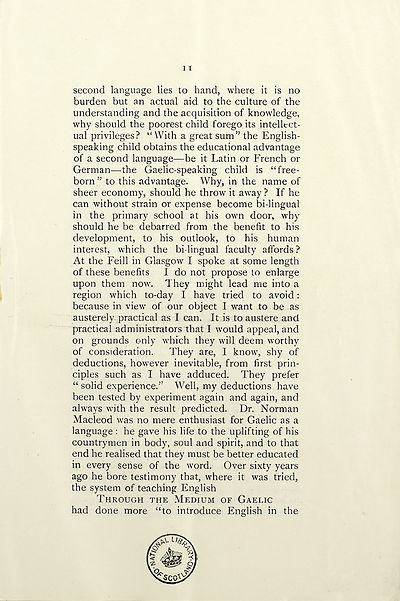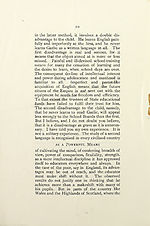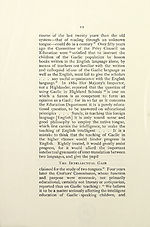Download files
Complete book:
Individual page:
Thumbnail gallery: Grid view | List view

second language lies to hand, where it is no
burden but an actual aid to the culture of the
understanding and the acquisition of knowledge,
why should the poorest child forego its intellect¬
ual privileges? “With a great sum” the English-
speaking child obtains the educational advantage
of a second language—be it Latin or French or
German—the Gaelic-speaking child is “free¬
born” to this advantage. Why, in the name of
sheer economy, should he throw it away ? If he
can without strain or expense become bi-lingual
in the primary school at his ow7n door, why
should he be debarred from the benefit to his
development, to his outlook, to his human
interest, which the bilingual faculty affords?
At the Feill in Glasgow I spoke at some length
of these benefits I do not propose to enlarge
upon them now. They might lead me into a
region which to-day I have tried to avoid:
because in view of our object I want to be as
austerely- practical as I can. It is to austere and
practical administrators that I would appeal, and
on grounds only which they will deem worthy
of consideration. They are, I know, shy of
deductions, however inevitable, from first prin¬
ciples such as I have adduced. They prefer
“ solid experience.” Well, my deductions have
been tested by experiment again and again, and
always with the result predicted. Dr. Norman
Macleod was no mere enthusiast for Gaelic as a
language : he gave his life to the uplifting of his
countrymen in body, soul and spirit, and to that
end he realised that they must be better educated
in every sense of the word. Oyer sixty years
ago he bore testimony that, where it was tried,
the system of teaching English
Through the Medium of Gaelic
had done more “to introduce English in the
burden but an actual aid to the culture of the
understanding and the acquisition of knowledge,
why should the poorest child forego its intellect¬
ual privileges? “With a great sum” the English-
speaking child obtains the educational advantage
of a second language—be it Latin or French or
German—the Gaelic-speaking child is “free¬
born” to this advantage. Why, in the name of
sheer economy, should he throw it away ? If he
can without strain or expense become bi-lingual
in the primary school at his ow7n door, why
should he be debarred from the benefit to his
development, to his outlook, to his human
interest, which the bilingual faculty affords?
At the Feill in Glasgow I spoke at some length
of these benefits I do not propose to enlarge
upon them now. They might lead me into a
region which to-day I have tried to avoid:
because in view of our object I want to be as
austerely- practical as I can. It is to austere and
practical administrators that I would appeal, and
on grounds only which they will deem worthy
of consideration. They are, I know, shy of
deductions, however inevitable, from first prin¬
ciples such as I have adduced. They prefer
“ solid experience.” Well, my deductions have
been tested by experiment again and again, and
always with the result predicted. Dr. Norman
Macleod was no mere enthusiast for Gaelic as a
language : he gave his life to the uplifting of his
countrymen in body, soul and spirit, and to that
end he realised that they must be better educated
in every sense of the word. Oyer sixty years
ago he bore testimony that, where it was tried,
the system of teaching English
Through the Medium of Gaelic
had done more “to introduce English in the
Set display mode to:
![]() Universal Viewer |
Universal Viewer | ![]() Mirador |
Large image | Transcription
Mirador |
Large image | Transcription
| An Comunn Gàidhealach > An Comunn Gàidhealach Publications > Gaelic in the Highland schools > (11) |
|---|
| Permanent URL | https://digital.nls.uk/122769703 |
|---|
| Description | This contains items published by An Comunn, which are not specifically Mòd-related. It includes journals, annual reports and corporate documents, policy statements, educational resources and published plays and literature. It is arranged alphabetically by title. |
|---|
| Description | A collection of over 400 items published by An Comunn Gàidhealach, the organisation which promotes Gaelic language and culture and organises the Royal National Mòd. Dating from 1891 up to the present day, the collection includes journals and newspapers, annual reports, educational materials, national Mòd programmes, published Mòd literature and music. |
|---|---|
| Additional NLS resources: |
|

